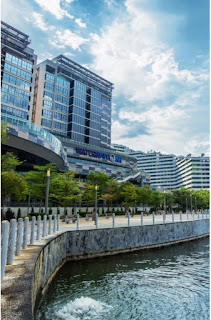On 16 May 2019, Frasers Centrepoint Trust ("FCT") announced that it is acquiring a 33.33% stake (S$440.6Mil) in Punggol Waterway Point from its sponsor Frasers Property. The suburban mall is conveniently located next to Punggol MRT/LRT/Bus Interchange and integrated with Watertown residential component on top of the mall. It serves as the main shopping mall for residents of Punggol new town and the footfall catchment area is huge as evident from the large crowd of shoppers even during the weekday.
1. FCT is a great defensive retail REIT with excellent DPU growth track record and many assets in the pipeline from its Sponser.
The acquisition of Waterway Point has a distinct advantage of further diversifying its earnings base from suburban shopping malls. This is the first large scale shopping mall being developed by Frasers, Far East Organisation & Sekisui House and managed by Frasers Property. The layout of Punggol Waterway Point shopping mall is very different from many traditional mall layouts. It is separated into an East Wing and a West Wing which are connected by a 24-hour walkway. Interestingly, this can get a little confusing for new shoppers trying to locate certain shops that they are intending to visit. Nevertheless, the shopping mall contains lots of F&B outlets, retail shops, a huge NTUC Finest supermarket and also many movie theatres including iMax by Shaw which draws excellent footfall into the mall.
I was a little surprised by the latest acquisition of Waterway Point by FCT in as they seemed to be on an aggressive warpath to grow their existing portfolio in 2019. Just less than 3 months ago, FCT had announced on 28 Feb 2019 that they were acquiring a 17.1% stake (S$342.5Mil) in one of the largest Singapore private retail mall fund. The fund, PGIM Real Estate Asia Retail Fund (PGIM Real Estate), owns and manages six retail malls in Singapore - namely Tiong Bahru Plaza, White Sands, Liang Court, Hougang Mall, Century Square and Tampines 1 - as well as office property Central Plaza.
In conjunction with the latest acquisition news, FCT will be launching an equity fundraising exercise via private placement and also preferential placement from existing shareholders. Funds raised will be used for the Waterpoint acquisition and also pare down debt for the previous PGIM Real Estate acquisition. Their underwriter DBS, will be announcing the details of the pricing of the non-renounceable rights issue for the preferential tranche on 27 May 2019.
2. Death of retail shopping malls in Singapore?
I do not agree with the many doomsayers over the upcoming decline of retail malls in Singapore due to the emergence of e-commerce. This is similar to the retail scene in China. A suburban shopping mall is currently part of a typical Singaporean family lifestyle with educational centers for kids, F&B options as well as various other entertainment options being made available. It is not just a pure retail shopping experience.
Also, for retail, a brick and mortar shop actually complements their e-commerce arm in terms of building up the brand's presence. The "future world" being envisioned by doomsayer whereby everyone stays at home after work hours waiting for all items to be delivered by Ninja van or Redmart is absurd. E-commerce will never be able to fully replace the family experience offered by suburban shopping malls. Shopping malls, in turn, are re-inventing themselves as a lifestyle mall with their own unique identity.
3. Parting thoughts
FCT is a very fascinating REIT as its manager has a growth mindset as well as an excellent track record in gradually growing its DPU for shareholders. Besides further piecemeal acquisition opportunities of additional stakes in Punggol Waterway point or PGIM Real Estate Asia Retail Fund, I am looking forward to their future acquisition of another star jewel in Yishun, that is, the south wing of Northpoint City.









